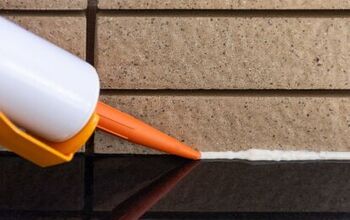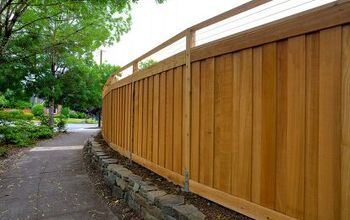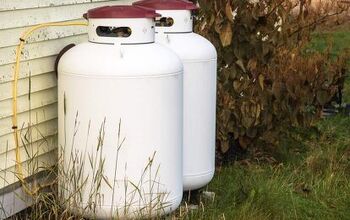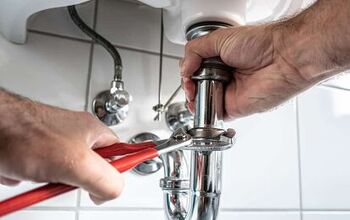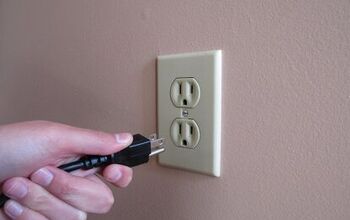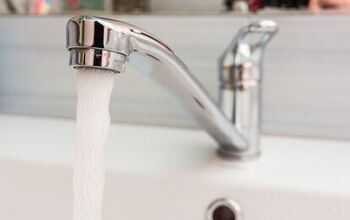What Are The Pros and Cons of Sealing An Asphalt Driveway?

When looking for ways to protect your home, there are a lot of different things to think about. Your driveway is something that gets used every day but isn’t often taken into consideration with regards to protection. By covering your asphalt driveway with a seal coating, you can help keep it in good condition.
The pros of sealing asphalt are that it can restore faded asphalt, prevent potholes, and protect against vehicle damage. Sealing asphalt will make the driveway hotter, it is expensive, and it can only be done in warm weather are some of the cons. You must reseal your asphalt every 1-2 years if you seal it initially.
In this article, we will cover the pros and cons of sealing an asphalt driveway. By considering all the angles, you can decide whether or not it is right for yours.
Do You Need Asphalt Paving Services?
Get free, zero-commitment quotes from pro contractors near you.

Pros of Sealing an Asphalt Driveway
Your asphalt driveway is, without a doubt, an investment. You want to protect both the pavement, and your hard-earned money. No one wants cracking, pot holes, or any other environmental condition depleting the structural integrity of their driveway.
In fact, asphalt sealcoating is the right approach for any asphalt driveway that you want to protect. Here are just some of the advantages to sealing your asphalt driveway:
1. It Can Restore Faded Asphalt
One of the major benefits of sealing your asphalt driveway is renewing its restorative shine. The seal coating finishes the asphalt in a dark black. This can increase curb appeal and give your driveway a newer look.
After many years, asphalt tends to fade. Even if it is dark black when it is originally laid, the sun will eventually take out the pigment. This leads to a graying effect that can almost wash out to white with enough time.
Sealcoating is made up of oils that penetrate into the asphalt through the pores and any cracks. These oils can help restore the deep shine of the original asphalt finish. They will also help protect it from the elements as the years go on, preventing more fading.
2. Prevents Potholes
Sealcoating is not just to restore your driveway’s original good looks. It is also made to protect the asphalt and make sure that it does not become brittle. When asphalt dries out, it can become breakable which leads to cracks.
The binder in seal coating is meant to prevent this brittleness from happening in the first place. This binder will make its way down to the core of the asphalt when it is applied. Combined with the oils, it will keep the driveway held together in hot weather.
Sealcoating prevents oxidation in the asphalt due to exposure to the elements. Because of this, you are much less likely to develop cracks.
If left untreated, cracks can eventually become potholes which are much more expensive and troublesome to fix.
3. Reseals Itself
Because of the compounds present in the seal coating, it is designed to do a small amount of self-maintenance. This is achieved by resealing itself every time it heats up. With exposure to the sun, the sealant will melt down and fill in any microscopic cracks.
This is a major benefit of sealing your asphalt driveway. Unsealed asphalt will become weaker the more it is exposed to the sun. If you apply a good sealant to your driveway, the sun will help strengthen it and mitigate any unwanted effects.
This resealing will also protect the driveway from oils, gravel, and anything else that cars might bring onto it. Runoff salt and gasoline will work to help fill in cracks instead of creating them.
4. Protection Against Water Damage and the Elements
Believe it or not, water can be a major source of damage for asphalt driveways. Additionally, water can seep into small cracks in the surface, freeze in cold temperatures, and cause larger cracks.
However, water isn’t the only thing that sealant protects your driveway from. Sealing your asphalt driveway will also make it resistant to extreme heat, and penetration by gas, oil, diesel fuel, salt, and various chemicals that could cause extensive damage.
5. Less Vehicle Wear
It is not just your driveway you are helping protect by sealing it. You can also prevent serious car troubles by making sure the asphalt is well maintained. Without a seal coating, your driveway could contribute to some major car troubles.
You drive on your driveway more than any other surface and your car should be able to roll on it easily. Cars like smooth, even surfaces. If your driveway is left unsealed, it could eventually develop cracks, divots and potholes.
Potholes could contribute to tire wear and even blowouts. Every time you drive over a pothole, you are putting undue stress on your chassis and suspension. All of these things could eventually lead to long term damage to your vehicle.
Cons of Sealing an Asphalt Driveway
Although the disadvantages pale in comparison to the benefits, for a proper analysis, they are worth mentioning. Here are some of the cons associated with sealing an asphalt driveway:
1. Driveway Will Become Hotter
One thing that you must keep in mind when sealing your driveway is that it will change the color. It may go from a lighter gray or even white to a deep, sleek black. Because of this, it may conduct heat much more than it did before.
The sun is attracted to dark colors. Deep blacks absorb heat and hold it in for much longer than whites or grays. Because of this, your driveway may absorb quite a bit more heat. This will contribute to a much hotter driveway.
Depending on the layout of your home, you might want to be very careful about how hot your driveway gets. If you have a lot of windows out front, they could let in a lot of that stored heat from the seal coating. You’d be surprised how much heat can transfer just from the darker color.
2. It Cannot Be Installed Year-Round
One major consideration that you should make when deciding whether or not to seal your driveway is the weather. It should be noted that seal coating can not be applied in cold weather Because of this, it will require some careful planning.
Sealcoating contains compounds that require heat to set. If you apply it in cold weather, it will not properly bond to the asphalt. This will make it even more brittle than before and you may even have to replace your whole driveway.
There are all-weather sealants that can be applied year-round. However, they are much more expensive than most other seal coatings. Unfortunately, this makes them cost-prohibitive for most individuals.
3. Initial Costs are High
It’s important to consider the fact that asphalt driveway sealer is not particularly cheap. To seal your asphalt driveway, you need to pay the initial costs of the sealer, in addition to, all of the supplies required to apply it successfully.
However, you can expect to save money in the long run by having a driveway that resists damage and doesn’t require pricey repairs.
4. Sealcoating Must Be Maintained
Sealcoating is not something that can be applied and then forgotten about for the remainder of your home’s life. It will have to be reapplied many times over the years. Without these re-applications, the sealant will become gummy and prone to crumbling.
In order for seal coating to offer the most protection, it must be applied in layers. These layers can not be done too close together otherwise it will become too thick and cracks will form. To avoid this, the layer must be applied once every 1-2 years.
Due to this layering process, seal coating can end up being quite expensive. You are going to have to decide how much it is worth to you to not have to replace the driveway.
By weighing these costs, you can find out if an asphalt sealant is right for you.
Related Questions
How do I prep my driveway for sealing?
Sweep away any debris that may have collected on the driveway with a large push broom. This will ensure that any dirt packed into cracks gets pried loose. If possible, rent a pressure washer to rinse the entire thing clear.
How often should asphalt driveway be sealed?
As a general rule of thumb, asphalt driveways should be sealed every one to three years to protect from damage and maintain their appearance. More specifically, if the colors of the small stones that make up the asphalt are visible, it’s time to reseal.
How long should you stay off a newly sealed driveway?
You should avoid a newly sealed driveway for 24-48 hours. It is very important that your driveway dries properly before any weight is put on it. Failure to do so could result in needing to reseal it.
Do You Need Asphalt Paving Services?
Get free, zero-commitment quotes from pro contractors near you.

Final Thoughts
Even though there are downsides to a sealed asphalt driveway, its protection is enough to make it worth it. The decrease in wear and tear on both your driveway and vehicles means it will eventually pay for itself.
With enough careful planning, it can be done efficiently and affordably.
A sealed driveway can be an investment that pays off in prevention. The more protected the outside of your home is, the happier the inside will be. Sealing your driveway can protect your home and cars for many years to come.
Related Guide

We are a team of passionate homeowners, home improvement pros, and DIY enthusiasts who enjoy sharing home improvement, housekeeping, decorating, and more with other homeowners! Whether you're looking for a step-by-step guide on fixing an appliance or the cost of installing a fence, we've here to help.
More by Upgraded Home Team



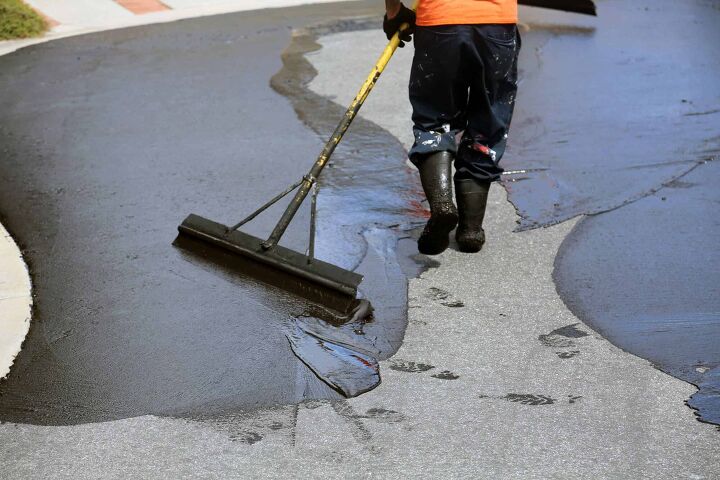






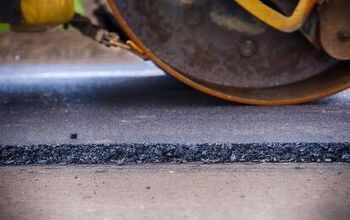

![Finishing Basement Without Permit [Is It Really Illegal?]](https://cdn-fastly.upgradedhome.com/media/2023/07/31/9070078/finishing-basement-without-permit-is-it-really-illegal.jpg?size=350x220)

